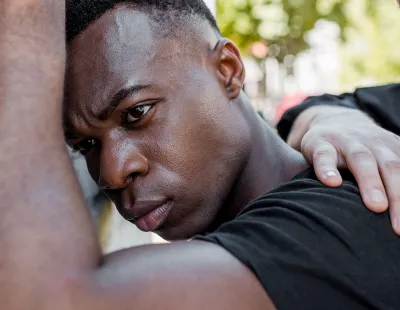Race Discrimination
The Macpherson Inquiry into the murder of Stephen Lawrence stated that the police service was institutionally racist. The Inquiry found consistent evidence of the ‘over-policing’ and ‘under-protection’ of Black, Asian and minority ethnic communities.
The Macpherson Inquiry was instrumental in the creation of our predecessor, the IPCC and is the reason the IOPC exists today.
More than twenty years on, much of the evidence provided to the Home Affairs Select Committee in its Macpherson: 20 Years on Inquiry (“the HASC Inquiry”), suggested that the police service has largely failed to overcome issues and perceptions of institutional racism.
The College of Policing's own report published in July 2021 highlighted the significant improvements still needed in this areas of policing.
Our own research and public confidence monitoring consistently show that some groups have less confidence in the police complaints system than White people - and are less likely to complain, particularly those from Black communities.
In September 2020, we launched of our thematic work on Race Discrimination to help tackle the issues widening the confidence gap between communities and policing.
Guide to Race Discrimination work
Our race discrimination thematic work was launched to explore, challenge and address issues of race discrimination within policing, using our learning to improve our own work, and policing practice.
We use our investigations, appeals, and reviews work to:
- identify trends and issues of concern to help drive real change in policing practice
- encourage an open and responsive policing culture
- help ensure we have a police service where all communities feel protected and respected by police
These areas of focus are vital in driving change to the areas that need it - helping to build trust and confidence in policing, and the police complaints system.
So far, we have delivered the following:
In August 2021, we published a report that made 17 national recommendations to improve taser use. Within the report, we address concerns about the disproportionate use of Taser against Black men and boys, and people with mental health issues.
We made 11 recommendations to the Metropolitan Police Service in August 2020 to help tackle concerns around the use of stop and search in London.
In April 2022, we continued this work on a national basis, publishing our national stop and search report issuing 18 recommendations on a series of issues, including disproportionality, bias and trauma. Following this report we surveyed the chief officers at all 43 territorial police forces to understand their assessment of stop and search. This report published in October 2023 provides a summary of some of the initiatives adopted by police forces to improve the use and scrutiny of stop and search.
In January 2022, following our Operation Hotton investigation we made 15 recommendations to the Metropolitan Police Service to tackle significant cultural issues within the force, including racism, bullying and sexism.
Our December 2022 edition of Focus was dedicated to the handling of matters involving race discrimination – particularly where the alleged discrimination is not obvious or ‘overt’.
In December 2023, a joint super-complaint investigation was conducted between the IOPC, HMICFRS (His Majesty's Inspectorate of Constabulary and Fire & Rescue Services) and College of Policing regarding section 60 Stop and Search. Read the super-complaint investigation report and media release.
In November 2024 we published a package of tools to support policing to improve the handling of discrimination complaints. The package includes revised guidelines and a comprehensive toolkit for complaint handlers.
In addition to these tools we published a detailed report which highlights how the police need to investigate discrimination allegations properly to ensure they are effectively handled first time so people can have confidence in the police complaints system.
In the report, we called for ‘focused and measurable change’ to remove racial disparities in the use of police powers including stop and search, use of force, strip searches, particularly on children, with more safeguards to prevent adultification bias and ensure fair treatment.
To help ensure consistency and best practice in our handling of discrimination cases we have made the following improvements:
Discrimination training and guidance
Internal training and guidance has been provided for our staff and decision makers who are involved in analysing, making and communicating decisions on issues of direct discrimination. We have particularly focused on discrimination that is not overt, such as bias and stereotyping.
Stop and search guidance
We have updated our stop and search guidance to ensure the recommendations we make in this area, inform our own approach to cases of a similar nature. This work covers key issues, including; legitimacy, quality and safety of the encounter, use of force, historical context and trauma. The updated guidance also provides links and information to ensure our staff consider the appropriate legislation, policies and guidance in this area.
Language guidance
We will ensure the language we use is sensitive and authentic. This has involved extensive stakeholder consultation – to ensure the changes we make are informed by the communities most impacted. The changes we have made include:
- We no longer to use the acronym BAME and where possible, we should be specific about the ethnicity we are referring to. If a collective term is necessary, we should write Black, Asian and minority ethnic – in full.
- Ethnicity must always be capitalised – i.e. Black and White.
- All those under the age of 18 must be referred to in our cases as child or children, not youths or juveniles.


